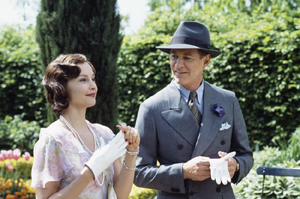|
De-Lovely (PG) |

|
De-Lovely is a charming, romantic musical about the life of songwriter Cole Porter. It’s a story which has been told before, notably in 1946’s Night And Day, in which Cary Grant played Porter as a dashing, romantic war hero. De-Lovely is a rather more accurate portrayal, as it deals openly with Porter’s homosexuality, and its damaging effect on his marriage. Porter is played by Kevin Kline, whose charm and precise manner make him an ideal choice. The film follows Porter’s life from his first meeting with Linda (Ashley Judd), a beautiful divorcée who becomes his wife. Their courtship is the most enjoyable part of the film, as Porter serenades her with some of the most memorable love songs ever written, and the audience are joined in hoping these witty, beautiful people will be happy together. Initially they are, but over time Porter’s boyfriends start to become a problem. Linda accepts that her husband is gay, but when his affairs start to cause her public embarrassment she resents the discourtesy. They separate briefly, but are soon back together, and after Linda’s eventual death Porter never writes another song. Refreshingly, De-Lovely steers clear of conventional confrontation scenes, and consequently feels more like real life than most films do. Usually, for example, we would expect a scene in which Linda demands that Cole choose between her and the boyfriends, but that doesn’t happen here. When Linda leaves Cole, she simply tells him she’s leaving, then smiles at him with sadness and affection as she drives off. The film opens with Porter as an old man, watching a musical play of his life. This device frames the action, leading us from scene to scene, as the older Porter adds his comments. It’s an idea that must have sounded ideal in the planning stages, but which is actually redundant in the film, as it adds nothing to the scenes. The opposite is true of the songs, which would make a far inferior film a thrilling experience. There are thirty songs in the film, most of which are staged musical numbers, sung by stars such as Robbie Williams, Elvis Costello and Diana Krall. At one point, the film apologises for following one song with another, but with songs like ‘Let’s Misbehave’, ‘Begin The Beguine’, and ‘Just One Of Those Things’, no apology is necessary. De-Lovely is a film that many will find easy to criticise. It’s a musical; that most unfashionable of genres; and it’s shamelessly romantic. Some will find it unrealistic to present Porter as being both gay and in love with his wife, but after all, this is the man who wrote ‘Anything Goes’. Regardless, De-Lovely is worth seeing twice for the songs alone, and how many musicals can you say that about? David Haviland, Sept. 29 2004 |
|